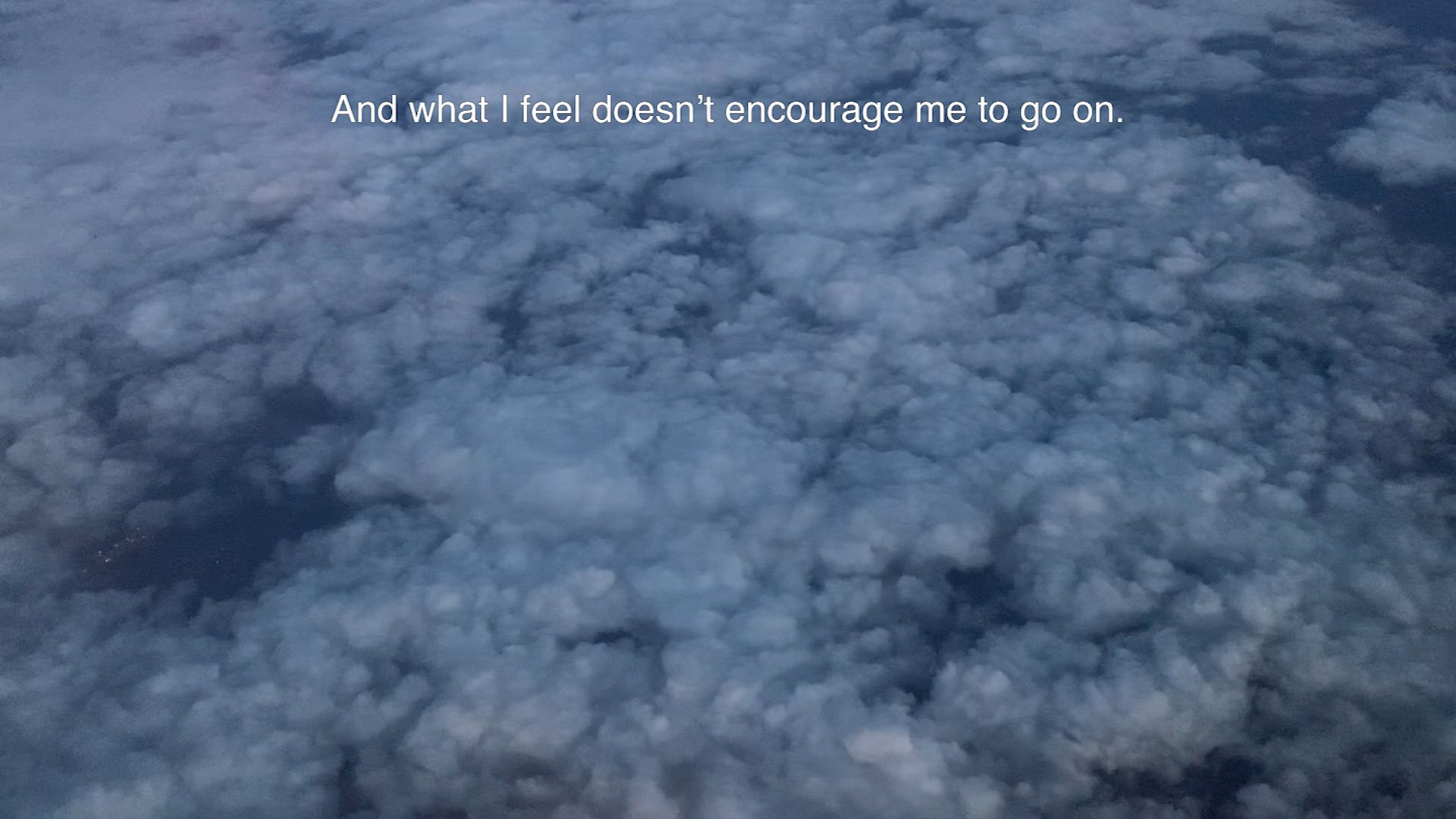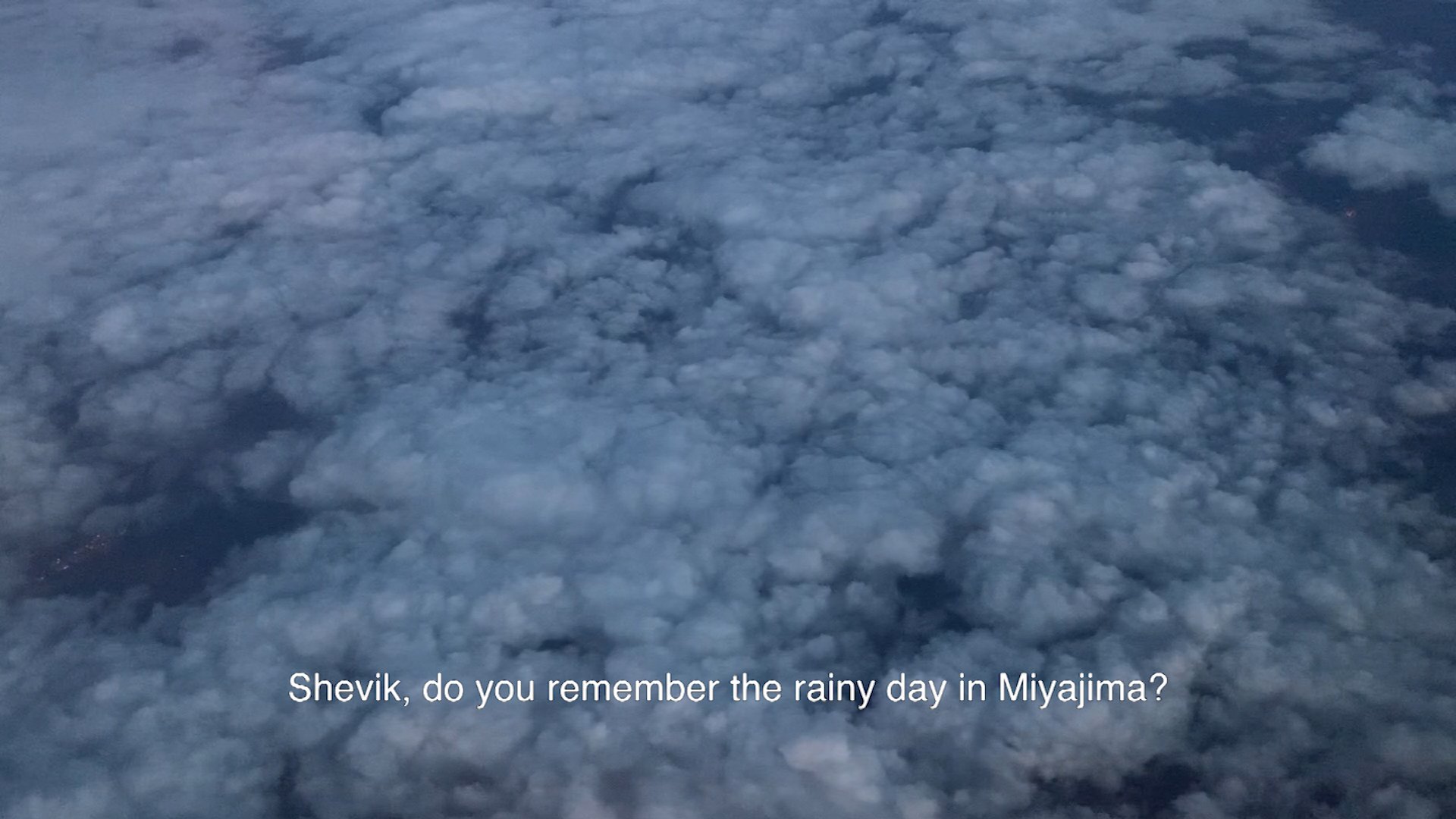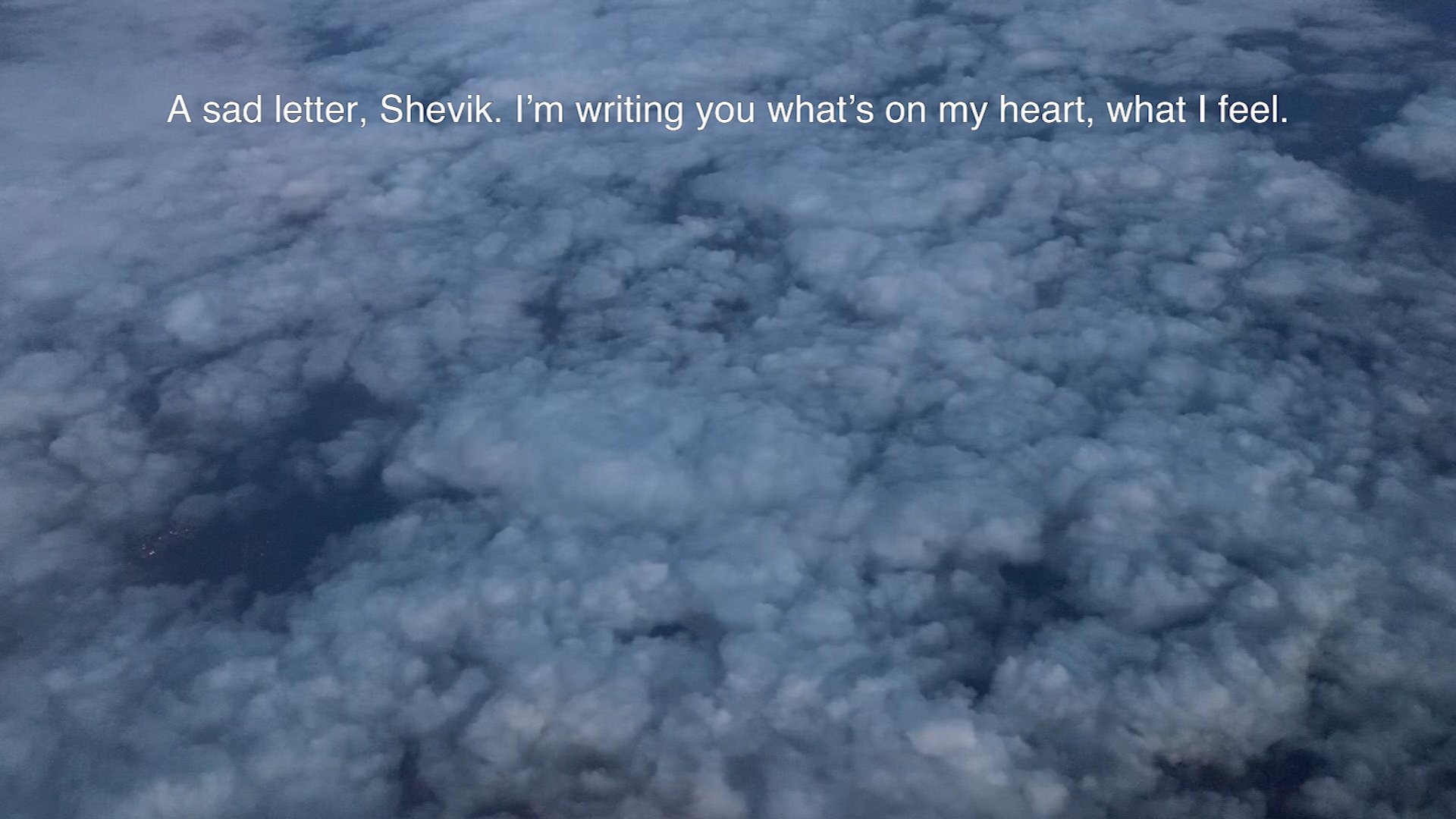“The Spaces In-Between: Letters to Shevik” Erin Gordon on Itamar Gov
It’s 21:30 and the house is completely silent. I haven’t managed to find anything interesting on television so I preferred to write to you, Shevik, to let you know what’s going on with me. [...]
Shevik, tonight in my dreams I was hovering above the arctic. Or maybe it was clouds. I couldn’t really tell. But it was so silent.[...]
I can hear your laughter, Shevik. Please, laugh a bit more, it makes me so happy to hear you. (1)
Interdisciplinary artist Itamar Gov’s Letters to Shevik explores the relationship between a man and his wife without explicitly stating so; instead, it uses language to sweep up the audience gradually into its intimacies. It’s quiet, contemplative, introspective, and, at times, mundane in the most magnetic way. The latter sentiment is what pulls you in, using minimal visual elements without a focus on the visual; it’s a visual novel that eschews the aural flourish of voiceover narration to concentrate on the lyricism of the words that float upon the screen. As the result of a fruitful, almost unbelievable find—in this case, Gov finding Isaac Katz’s letters to his wife Bat-Sheva (affectionately called Shevik throughout the work)—the artist utilizes pre-established archival text to grasp the underlying, raw emotions behind each word while unearthing a fragment of the past that he’s perhaps removed from in many ways, yet inextricably linked to. At fifteen minutes in length, it slowly explores the unspoken nuances of absence and loss, and what fills the spaces in-between.
The screen is black for a few moments, easing its viewer in. I’m able to quietly settle into the darkness. In an ideal world, I would be watching this within the silent darkness of a proper viewing room, waiting for the welcoming flash of light from the projector. Words appear at the bottom of a screen; they’re fragments from a letter, subtitles without spoken dialogue to call home. Isaac has been thinking of his wife, Bat-Sheva, who passed away years prior. There’s an unmistakable loneliness in his words as well as a comforting familiarity in the address. He sits within the unavoidable contemplative nature of old age while speaking to his partner. Gov gradually moves through the timbre of every sentence, allowing for a metered read of the content; it’s almost intended to soak in gradually and be explored, rather than be experienced all at once. It is hard not to imagine this piece without the component of a physical space; however, the blatant silence of the work itself remains jarring yet all-consuming regardless of viewing method.
Perhaps what is most uncannily exhibited by this work is the underlying utilization of affect to pull the viewer in, leaving them bereft with each sentiment and how it relates to one’s own life. It aptly evokes the aura of the bereaved while leaving its audience with an acute awareness of their own bodily presence in and with the work itself. It is not particularly eye-catching, and I don’t believe it is intended to perform in that way; it is meant to be sat with, to be considered, to be mulled over. Solely resting on the laurels of the text, Letters situates itself upon each word, creating a slow unraveling of the work itself. Through the dictation of each letter, and perhaps it is hard to say how many are shown, Isaac Katz and Shevik are there, but not really. They become all of us, anyone who has felt immense longing, grief, fondness, nostalgia.
When Isaac writes that he dreamt of floating, the text shifts to the center of the screen, in the midst of the clouds that slowly move behind. It’s a marked shift in tone, as subtle as it may appear. Text has been situated at the bottom of the screen until this point, keeping the viewer directed to each quiet subtitle as they appear in sequential order. Dreams, though fleeting, leave an indelible mark on its recipient upon waking. Although they reside in the realm of the intangible, they have an uncanny way of shaping emotions and feelings, as well as shifting the tone. They’ve evolved into a host of literature for the searching, curious-minded of us all; I used to look at dream dictionaries in the bookstore when I was younger to find the further relief that could only be allowed through an otherworldly knowledge that made things seem more important than they were.
In A Lover’s Discourse, Roland Barthes briefly touches upon remembrance and anamnesis, or what we think of as the recollection of past occurrences in one’s life from the position of the present: “The imperfect is the tense of fascination: it seems to be alive and yet it doesn’t move: imperfect presence, imperfect death; neither oblivion nor resurrection; simply the exhausting lure of memory.” (2) It ties directly into the act of waiting, remembering, and longing for something that isn’t immediately there with the stain of emotion or affect. Isaac wakes up after dreaming of Shevik, realizing she isn’t there. He’s wounded yet pleased to have been intangibly in her presence.
The soft inflections of crashing waves swell as Isaac recalls a trip to Cyprus with his beloved Shevik. Rather than startling due to the prior absence of noise, it is immensely calming; the ambient nature of the experience becomes omnipresent and welcoming without fear or dread. It welcomes actively accessing memories of the ocean—the tangy scent of the water wafting with the cool breeze. The sound of the wind with a hint of musicality causes a sensation of longing; in this case, wondering how all-consuming this piece would be in a dark room, filling my ears with the soft cadence of ambient noise and the gentle drone barely beneath its surface.
A semblance of pain colors his words as he references his age and his own perception of his ability to meaningfully contribute to society at a certain point. What are our bodies worth, if not to do something—anything—meaningful? I think of the dull ache in my neck, wondering if it will only get worse, traveling deeper—if I’ll get any more or less lost or alone in my own thoughts when there is nowhere else to go.
The work is ultimately an accompaniment to the lyricism of Isaac’s words. It is evident he is creative and introspective as a writer, full of unabashedly vivid descriptions alongside a mere statement of facts directed towards an audience of one. They’re letters to nowhere, letters as an ode to remembrance and the act of constant remembering. At times, he briefly refers to the people in his life with the levity and warmth of familiarity, including an offhand reference to Gov (as a small child) himself. It’s a small glimpse into realizing Gov connects to this work personally without overtly stating so—it’s a tongue-in-cheek signature dotting the surface of the video itself.
The music gradually swells as the sky darkens. The stark contrast of black pivots to a scene above the clouds. We are floating along with each word, every turn of phrase, each musing about his meals. Would Bat-Sheva want him to eat well? The clouds continue to move beneath us as the text shifts to the top of the screen. The utter viscerality of it all is heightened by the absence of the visual and the aural. Images do not tell the story; rather, they merely underline the text itself. It is a rumination on love, loss, and the passage of time. It speaks to the body, its presence or the lack thereof. How flesh and bone leaves an indelible mark on one’s memory. Are letters fulfilling their intention if they’re speaking directly to what seems like a void or the absence of personhood? Are Isaac’s letters directed to the memory of his beloved Shevik rather than Bat-Sheva herself? It’s undeniably poignant and heartbreaking, yet calls to mind the role of words and sentences when removed from the author and recontextualized.
We are Isaac and his self-guided journey of preservation as the work swells to its end. What continues to make every minute so incredibly affective is the positioning of the viewer’s perspective within each disembodied word; to absorb the work is to sit within one’s body. It speaks directly to bodily presence alongside the work without distraction from visual or aural elements. Every smile, every touch, every laugh. It threads together bodily presence and emotion; my arms prickled as Isaac recalled Bat-Sheva’s passing with a tone of resignation mixed with a hint of lingering pain. It never gets easier, does it? The passage of time is effectively collapsed by this work, yet we become acutely aware that it is coming to a close.
My grandma passed away in 2011, leaving my grandpa relatively alone. I often wonder how he felt during that time—if it had felt like much longer as she slipped away much earlier due to dementia. “I’m doing the best I can,” he’d say whenever I called him. With Isaac’s words to his Shevik, he was doing his best and it felt absolutely extraordinary.
(1) Itamar Gov, Letters to Shevik, One-channel video and sound installation, 15:00, 2021.
(2) Roland Barthes, A Lover's Discourse: Fragments, trans. Richard Howard (New York, NY: Hill and Wang, 2010), pp. 216-217.
Itamar Gov (*1989) is an interdisciplinary artist whose practice consists of sculptural and spatial installations, as well as graphic and video works. Addressing the intricate relations between history, ideology and aesthetics, his projects explore various forms of personal, collective and institutional memory. Since 2010 he has been living between Berlin, Paris and Bologna, where he studied cinema, history and literature.
Approaching forgotten micro-histories as a means to shed light on vast socio-political landscapes, the starting point of Gov’s projects is an inquiring scepticism towards cultural traditions, conventions and gestures that are considered self-evident. His works are based on ongoing research and revolve around the intersection of art and politics, highlighting the strong tension between the known and the supposed, and challenging any assumption of clear borders between facts and falsehoods, reality and imagination. Never providing a full and complete picture, he invites viewers to engage with the elements of the works and to become part of an inquisitive process.
A member of the curatorial teams of documenta 14 (Kassel, Athens), Haus der Kulturen der Welt (Berlin) and Fondazione Adolfo Pini (Milan), in 2021 Gov was awarded a residency grant at the Cité Internationale des Arts in Paris.




